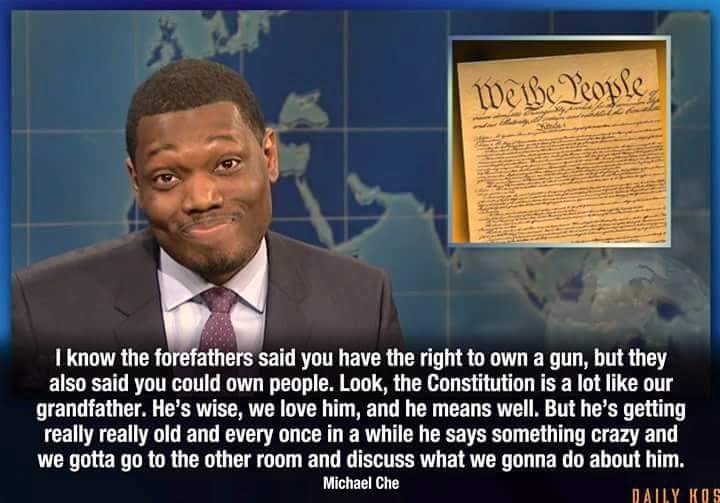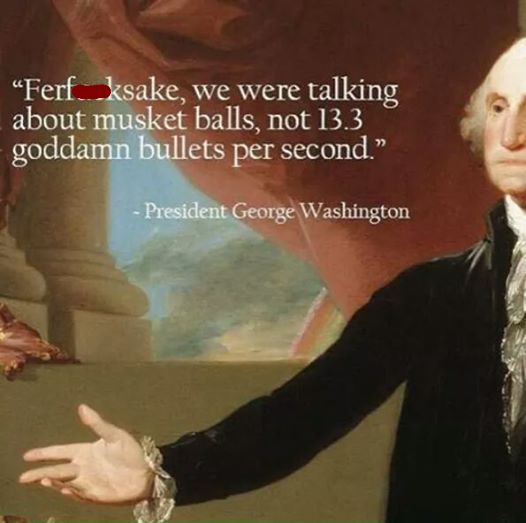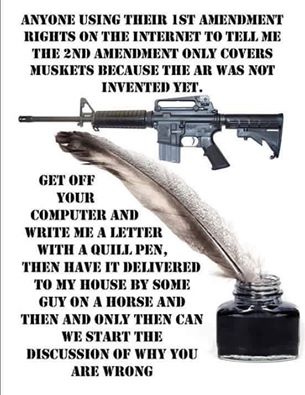Speaking as a gun-owner and gun rights advocate, I actually appreciate this meme:
This meme gets to what is, I think, the heart of the issue here: if you don’t like the level of access Americans have to guns, you should advocate for changing the Constitution.
Because the fact is that gun ownership is a constitutionally protected right. And maybe you don’t think it ought to be, and that’s okay. But then the solution is to amend the Constitution, not to ignore it or try to circumvent it. I don’t want to get rid of or even modify the 2nd amendment, but I am more comfortable with people trying to do that than I am with encouraging the government to deprive its citizens of constitutionally protected rights without due process. However you feel about private gun ownership, that is a terrible precedent.
And that’s why memes like these annoy me:
Whatever you think of the healthcare debate, owning a gun is a right. It’s not as if gun rights advocates just made this up–it’s specifically delineated in the document our society normally treats as the most authoritative law of the land.
Imagine such a dismissive attitude applied to other constitutional rights:
There’s something seriously wrong with a country that thinks a college education is a privilege but that freedom of the press is a right.
There’s something seriously wrong with a country that thinks a living wage is a privilege but a trial by jury is a right.
There’s something seriously wrong with a country that thinks owning a home is a privilege but voting is a right.
Does that sound a little messed up to you?
And look, I get it. A lot of people don’t think owning a gun should be on par with freedom of the press or the right to vote. I disagree, but if that’s what you think, okay. Argue we should change the Constitution. But it just doesn’t make sense to treat this debate as if the Constitution is irrelevant.
Some people argue our forefathers would’ve never intended the 2nd amendment to be applied the way it is today.
(And the response…)
But whatever you think our forefathers originally meant, the Supreme Court has upheld the right of citizens to individually own guns.
I don’t pretend to know the answer to gun violence. It’s clear guns have been used for a lot of violence, but I think gun control advocates downplay the number of Americans who have protected themselves with guns.[ref]That’s not to say I think the 2nd amendment is purely about private citizens protecting themselves from one another, but that I think the relationship between gun control and safety isn’t as clear cut as some suggest.[/ref]

I also think gun rights advocates often do a pretty poor job addressing the very legitimate heartbreak and fear people have about mass shootings and other gun violence.

Defending the right to bear arms in the wake of something as horrible as Pulse doesn’t appeal to me at all. It’s like a more intense version of defending free speech in the wake of some hateful Westrboro Baptist Church picket, or defending our rights to due process knowing that means a lot of rapists never see a day in prison. I’m not indifferent to these outcomes. But I’m also not willing to agree the Constitution applies only as long as we’re not heartbroken or enraged. It applies all the time.




You’re mis-casting the debate as one between allowing gun ownership and not allowing gun ownership, when that is really NOT what is going on. The question is about limitations and controls of that right. Your drawing the parallel with voting rights is perhaps more salient than you realized. For some people, in some parts of this country, it is arguably easier for certain people to buy a gun than it is to vote. Why is that, if they are both rights granted by the Constitution? Because Congress has the ability to clarify, regulate and dictate anything that is not explicit in the Constitution, without actually having to change it. If Congress can argue that a specific regulation does not infringe upon the ability of a citizen to keep and bear arms, it is fair game. THE TYPE OF ARMS IS NOT EXPLICIT.
My post was inspired by the attempt to block people on FBI watch lists and no-fly lists from being able to purchase guns. In that case it is about being able to purchase guns or not, as opposed to being able to purchase certain types of guns or being able to purchase guns after going through certain processes. The hyperlink for the words “without due process” is to the ACLU’s objections to depriving people of rights based on watch lists and no-fly lists: https://www.aclu.org/blog/washington-markup/use-error-prone-and-unfair-watchlists-not-way-regulate-guns-america
“But whatever you think our forefathers originally meant, the Supreme Court has upheld the right of citizens to individually own guns.” I am always impressed when people, in genuine humility, defer to the experts about what the Constitution requires. Your second meme seems to dismiss this in just the way you mention. However, if you want to dismiss the interpretation that limitations of the right to own guns apply all the way down to those available at the time of the founding, I think you also have to defer to the SCOTUS. They’ve been pretty clear that freedom of the press applies to the most advanced technology for communication, but the right to bear arms doesn’t apply to our most powerful weapons. So the fourth meme’s suggestion of parity there seems very much at odds with the humility before the court you’ve otherwise expressed. Similarly, though there is an individual right to bear arms, the court has been clear that there are still many limitations available to restrict gun ownership which aren’t currently in place, and many of these are exactly what are being sought now.
My own view is that the terrorist watch lists are so problematic that I hope they are used to restrict gun ownership, so that a case involving them is more likely to get to the court and overturn their use for no-fly purposes as well as gun restrictions. With Democrats now tying themselves to these lists, that seems like a bipartisan failure to protect civil liberties, so a defeat of them might help emphasize our common interest in freedom. So often, it seems as though our political system can only advance freedom as a partisan win for one side, which tends to taint our attitudes toward those freedoms.
I didn’t take the fourth meme to suggest anyone should be able to own any weapon, though I can see how someone would interpret it that way. I took it to be saying we don’t limit constitutional rights to specifically whatever technology happened to be available at the time the Constitution was written.
I also don’t know if I’d describe my SCOTUS references as “humility before the court”? My point isn’t that the court is infallible and we must agree with every decision it makes. My point is that the right of an individual to bear arms isn’t an interpretation we’re trying to get recognized–it’s a right that’s already been established. I don’t think it’s set in stone, if for no other reason than the Constitution itself isn’t set in stone.
I can see from your comment and Tyler’s comment earlier that my post wasn’t very clear. I’m not arguing there should be no limitations whatever. I’m arguing that whatever limitations we debate should be in the context of the fact that individual gun ownership is a constitutional right. My post was inspired specifically by the watch and no-fly lists you’re talking about. I agree those lists are problematic and if this comes to pass I hope you’re right that it brings the lists into the spotlight. But I’m worried it’ll just mean the lists stay as they are and now as a bonus they can be used to curtail other rights (whether that’s gun ownership or something else).
Tyler: “If Congress can argue that a specific regulation does not infringe upon the ability of a citizen to keep and bear arms, it is fair game. THE TYPE OF ARMS IS NOT EXPLICIT.”
Fair enough; however, it is not possible. Any regulation is an infringement. Of course, I can hear the cries; “do you want everyone to be able to carry an Uzzi under their coat?” Perhaps not; but those who wish to already do, and there’s NOTHING anyone can do to stop them. Anyway, that’s not the point either. The issue is the slippery slope of deciding at what point a regulation begins “infringing.” That’s a question that has precisely as many answers as there are opinions regarding what’s reasonable and not.
Rob, fortunately the founders knew there would be disagreements on point of law such as this and provided a solution. There is a whole branch of government with final authority to decide whether the laws passed by congress, or actions made by the President are allowable under a reasonable interpretation of the Constitution, the Judiciary Branch. Thus far, they have not significantly curtailed the regulation of the right to bear arms. It is primarily a paralyzed congress that has been unable to pass regulations.
“It is primarily a paralyzed congress that has been unable to pass regulations.”
Thank God! That “paralysis” is the result of legislators who realize that they must face voters, realizing that a majority of Americans cherish the Bill of rights; most of those recognizing that there is no need for more regulation. If anything, the 2A is severely overregulated as it is. So, if more regulation is so important, why are we not enforcing many of the regulations already there that have greater potential for curbing gun violence?
I would like to point out that as far as I can tell, the gun lobby didn’t start the conversation about guns – they are only responding to the progressive narrative that Pulse was caused by guns, rather than philosophy, religion, or mental illness, and the only appropriate response to this horrific tragedy is legislation about guns, not anything else.